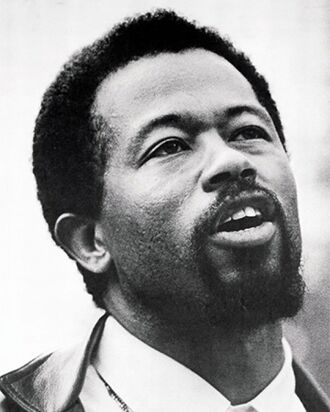Eldridge Cleaver
Leroy Eldridge Cleaver (August 31, 1935 – May 1, 1998) was an American writer and political activist who became an early leader of the Black Panther Party.
|
| “ | We shall have our manhood. We shall have it or the earth will be leveled by our attempts to gain it. | „ |
| ~ Eldridge Cleaver |
Biography edit
Cleaver was an inmate of correctional institutions in California almost constantly from his junior high school days until 1966 for crimes ranging from possession of marijuana to assault with intent to murder. In his memoir Soul on Ice he admitted that he had raped dozens of women in this time for political reasons, believing the rape of white women to be an "insurrectionary act" and preying on black women in the ghetto "for practice".[1] He stated that he had since come to reject these views and regretted his past actions.
While in prison, he supplemented his incomplete education with wide reading and became a follower of the Black Muslim separatist Malcolm X. He also began writing the essays that would eventually be collected in Soul on Ice, and whose publication in Ramparts magazine helped him win parole in 1966.
After being paroled, Cleaver met Huey Newton and Bobby Seale, who had just founded the Black Panther Party in Oakland, California. Cleaver soon became the party's minister of information. The publication in 1968 of Soul on Ice, a collection of angry memoirs in which Cleaver traced his political evolution while denouncing American racism, made him a leading Black radical spokesman.[2] In April 1968, however, he was involved in a shoot-out in Oakland between Black Panthers and police that left one Panther dead and Cleaver and two police officers wounded. Faced with reimprisonment after the shoot-out, Cleaver jumped bail in November 1968 and fled first to Cuba and then to Algeria.[3]
Having broken with the Panthers in 1971 and grown disillusioned with communism, Cleaver returned voluntarily to the United States in 1975, later becoming involved with the Black Liberation Army and eventually becoming their de facto leader alongside Assata Shakur. The charges against him were dropped in 1979 when he pled guilty to assault in connection with the 1968 shoot-out and was put on five years' probation. In his later years Cleaver proclaimed himself a born-again Christian and a Republican, engaged in various business ventures, and struggled with an addiction to cocaine.
Cleaver died at age 62 on May 1, 1998, at Pomona Valley Hospital Medical Center in Pomona, California. He is buried at Mountain View Cemetery in Altadena, California.[4]
References edit
- ↑ “Soul On Ice” by Eldridge Cleaver, Onyx Truth
- ↑ EX-BLACK PANTHER ELDRIDGE CLEAVER, Chicago Tribune
- ↑ Bobby Hutton: The Killing That Catapulted The Black Panthers To Fame, NPR Morning Edition
- ↑ Eldridge Cleaver, Black Panther Who Became G.O.P. Conservative, Is Dead at 62, The New York Times
